Science, Engineering, and Technology
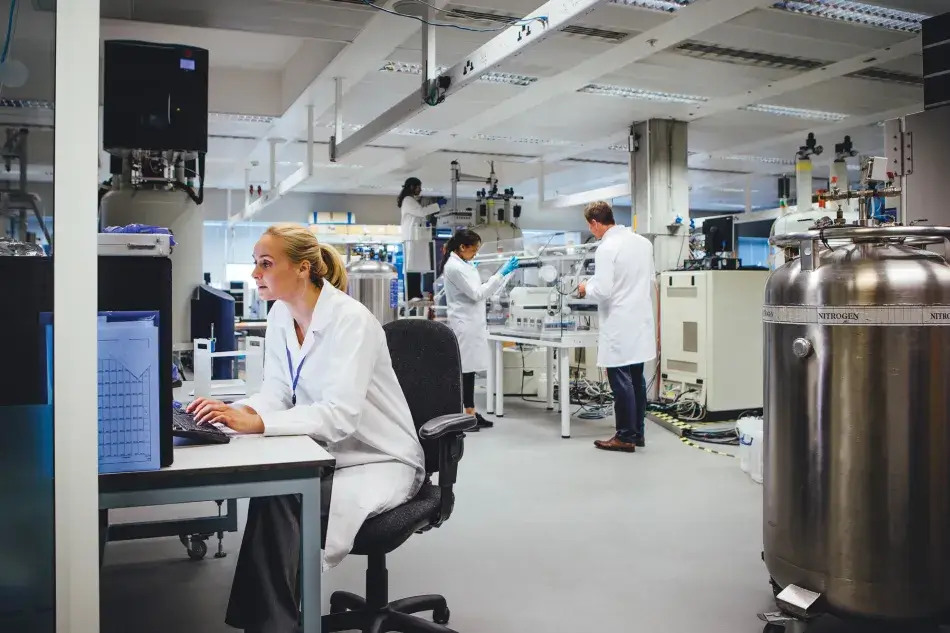
Academy projects in Science, Engineering, and Technology seek to strengthen the capacity of science and engineering to improve the human condition. This goal has never been more important for the nation or for the world. Global challenges increasingly require collaboration across disciplinary, professional, and national boundaries, while rapid advances in information processing and transmission raise new issues for both the management of scientific and technical information and for the ability of individuals and institutions to assimilate and act on new discoveries.
Drawing on the broad expertise of its membership and outside experts, Academy studies in Science, Engineering, and Technology analyze the impact of advances in these areas and develop policy recommendations that are made available to government, academia, nongovernmental organizations, and the private sector. Activities focus on increasing public understanding of current research and technological change, and on helping society adapt effectively and make meaningful use of new scientific and technical knowledge. Areas of interest include U.S. productivity in science and engineering; public understanding of, and trust in, science, engineering, and medicine; and how the adoption of new technologies shapes, and is shaped by, societal values and individual and institutional decision-making.
Program Advisory Committee
CHAIRS
Alan Leshner
formerly, American Association for the Advancement of Science
Geraldine L. Richmond
University of Oregon
MEMBERS
Nancy C. Andrews
Duke University School of Medicine
Mary Beckerle
University of Utah
Arthur Bienenstock
Stanford University
Emery Brown
Massachusetts Institute of Technology; Harvard Medical School; Massachusetts General Hospital
Claude Canizares
Massachusetts Institute of Technology
Gerald Chan
The Morningside Group
David Clark
Massachusetts Institute of Technology
Wayne Clough
Georgia Institute of Technology; formerly, Smithsonian Institution
Robert Horvitz
Massachusetts Institute of Technology
Leah Jamieson
Purdue University
Cora Marrett
formerly, National Science Foundation
James Simons
Simons Foundation
Jeannette Wing
Columbia University
Project
The Public Face of Science
The Academy’s multiyear initiative on the Public Face of Science addresses various aspects of the complex and evolving relationship between scientists and the public, and examines how trust in science is shaped by individual experiences, beliefs, and engagement with science. Additional project activities include the role of science in the legal system and the coordination and deployment of scientific teams as part of crisis response.
The initiative has brought together a broad range of experts in communication, law, humanities, the arts, journalism, public affairs, and the physical, social, and life sciences. While this project does not directly address scientific literacy in K-12 and adult education, it will inform such efforts by fostering a greater understanding of the public’s attitudes toward science.
The first project report, Perceptions of Science in America, aggregated data on the current understanding of how Americans view science, scientists, and the impacts of scientific research. The second project report, Encountering Science in America, highlights the numerous ways that individuals encounter science in their everyday lives. The forthcoming final report will present recommendations for improving the practice of science communication and engagement.
PROJECT CHAIR
Richard Meserve
Covington & Burling LLP; formerly, Carnegie Institution for Science
STEERING GROUP MEMBERS
Emilio Bizzi
Massachusetts Institute of Technology
Geoffrey Cowan
University of Southern California
Ellen Futter
American Museum of Natural History
Sylvester James Gates, Jr.
Brown University
Robert Hauser
American Philosophical Society
Rush D. Holt, Jr.
American Association for the Advancement of Science
Kathleen Hall Jamieson
University of Pennsylvania
Venkatesh Narayanamurti
Harvard University
Nora Newcombe
Temple University
Kenneth Prewitt
Columbia University
Rebecca Rimel
Pew Charitable Trusts
Cristián Samper
Wildlife Conservation Society
Samuel Thier
Harvard Medical School; Massachusetts General Hospital
PROJECT STAFF
John Randell
Erica Kimmerling
Rebecca Tiernan
FUNDERS
Gordon and Betty Moore Foundation
Rita Allen Foundation
Alfred P. Sloan Foundation
Project Publications

Science During Crisis: Best Practices, Research Needs, and Policy Priorities
Rita R. Colwell and Gary E. Machlis (American Academy of Arts and Sciences, 2019)
Encountering Science in America
(American Academy of Arts and Sciences, 2019)
Perceptions of Science in America
(American Academy of Arts and Sciences, 2018)
“Science & the Legal System,” Dædalus
edited by Shari Seidman Diamond & Richard O. Lempert (2018)
Project Meetings
Understanding Public Attitudes and Engagement with Science
September 20, 2018
University of Pennsylvania
Philadelphia, PA
Philadelphia-based Academy members gathered for a discussion of the findings and recommendations from the Public Face of Science initiative. Members of the project steering committee, including Kathleen Hall Jamieson and Nora S. Newcombe, shared what they had learned about how Americans perceive and engage with science, and facilitated a discussion on how these insights impact the practice of science communication and engagement.
MEETING CHAIRS
Kathleen Hall Jamieson
University of Pennsylvania
Nora S. Newcombe
Temple University
FEATURED SPEAKER
Erica Palma Kimmerling
American Academy of Arts and Sciences
Science & the Legal System
October 29, 2018
National Press Club
Washington, D.C.
To mark the public release of the Dædalus issue on “Science & the Legal System,” published in fall 2018 as part of the Public Face of Science initiative, the Academy hosted a panel discussion with guest editors Shari Diamond and Richard Lempert and several of the contributors to discuss the challenges posed by the increasing role of scientific evidence in legal cases as well as possibilities for improvement and reform.
SPEAKERS
Shari Seidman Diamond
Northwestern University Pritzker School of Law
Richard O. Lempert
University of Michigan
Nancy Gertner
Harvard Law School; formerly, U.S. District Court for the District of Massachusetts
Jed S. Rakoff
U.S. District Court for the Southern District of New York; Columbia Law School
David S. Tatel
U.S. Court of Appeals for the District of Columbia Circuit
Trust in Science: Vaccines
January 29, 2019
Benjamin Franklin Hall
Philadelphia, PA
“Trust in Science: Vaccines” was the first event in a series inspired by the Academy’s report, Perceptions of Science in America. Presented by the Consortium for History of Science, Technology and Medicine and the American Philosophical Society, the meeting examined vaccine skepticism in contemporary America, historically, and in the clinic. Hellman Fellow Erica Kimmerling participated in the panel discussion and spoke about public trust in vaccines.
SPEAKERS
Jeffrey Baker
Duke University School of Medicine
Elena Conis
University of California, Berkeley
Robert M. Hauser, moderator
American Philosophical Society
Erica Palma Kimmerling
American Academy of Arts and Sciences
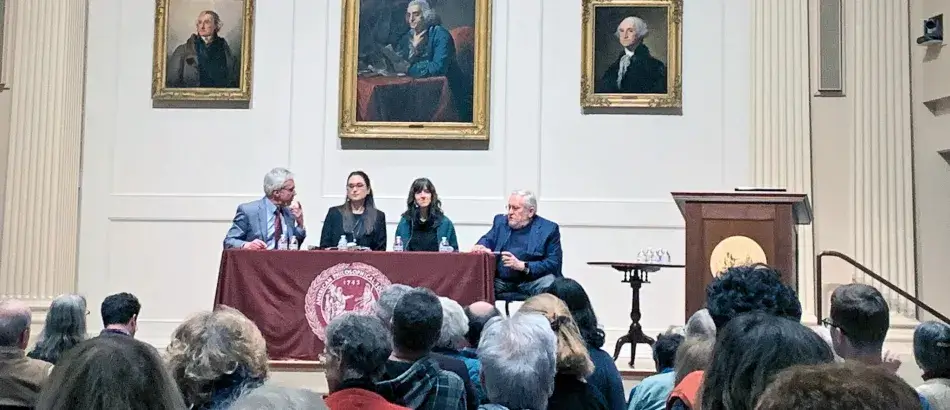
Building, Exploring, and Using the Tree of Life
March 6, 2019
House of the Academy
Cambridge, MA
For decades, Douglas E. Soltis and Pamela S. Soltis have collaborated with scientists worldwide to harness algorithm development, computer power, and DNA sequencing to produce a comprehensive Tree of Life representation of all 2.3 million named species. At a meeting held at the Academy, they described their work and how the Tree of Life can be used to illustrate, instruct, and inspire the public about biodiversity.
SPEAKERS
Douglas E. Soltis
University of Florida
Pamela S. Soltis
University of Florida
Scott Vernon Edwards, moderator
Harvard University
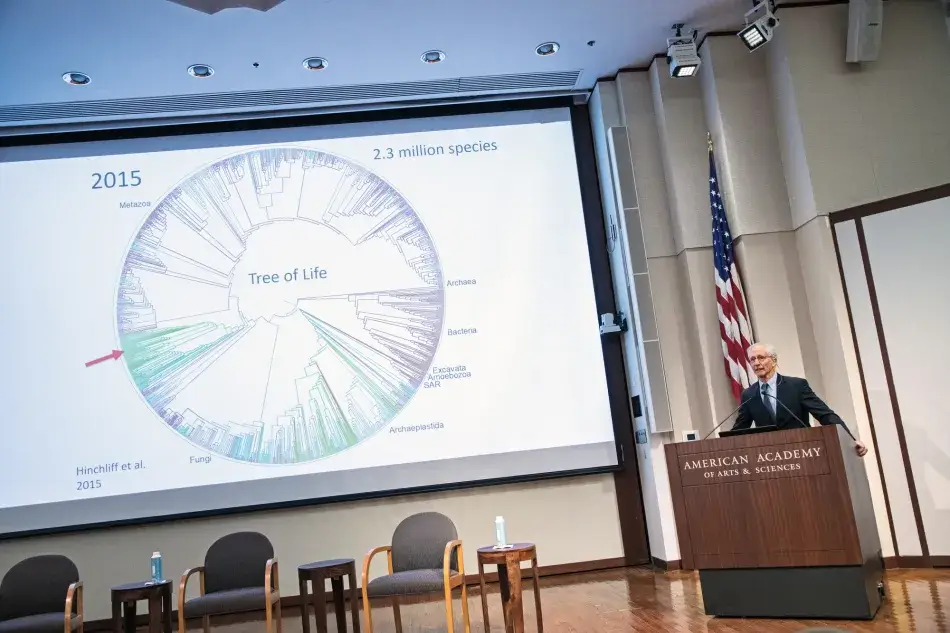
Cultivating Public Engagement with Science
March 7, 2019
House of the Academy
Cambridge, MA
Students from the Harvard Graduate School of Education participated in a meeting at the Academy about science engagement. Megan Cuzzolino, a doctoral candidate at the Harvard Graduate School of Education, created a course based on the Academy’s report, Perceptions of Science in America, in which her students were asked to design a science engagement product that effectively communicates a scientific topic to an identified audience. At the meeting, Hellman Fellow Erica Kimmerling gave an overview of the Public Face of Science initiative and the students presented their projects to local science communication experts.
SPEAKERS
Megan Cuzzolino
Harvard Graduate School of Education
Erica Palma Kimmerling
American Academy of Arts and Sciences
INVITED EXPERTS
Jennifer Cutraro
Science Storytellers
Julie Ann Fooshee
MIT Museum
Stephanie Keep
National Center for Science Education
Brindha Muniappan
MIT Museum
Science During Crisis: The Release of a New Report and a Call to Action
March 19, 2019
National Press Club
Washington, D.C.
The Academy released its report on Science During Crisis at an event at the National Press Club that featured authors Rita Colwell and Gary Machlis and a panel discussion with Brad Kieserman, head of disaster response and operations at the American Red Cross. Academy President
David Oxtoby moderated the discussion. The program provided insight on the important role science plays during crisis response, emerging best practices, and areas for continued research.
SPEAKERS
Rita R. Colwell
University of Maryland
Brad J. Kieserman
American Red Cross
Gary E. Machlis
Clemson University
David W. Oxtoby, moderator
American Academy of Arts and Sciences
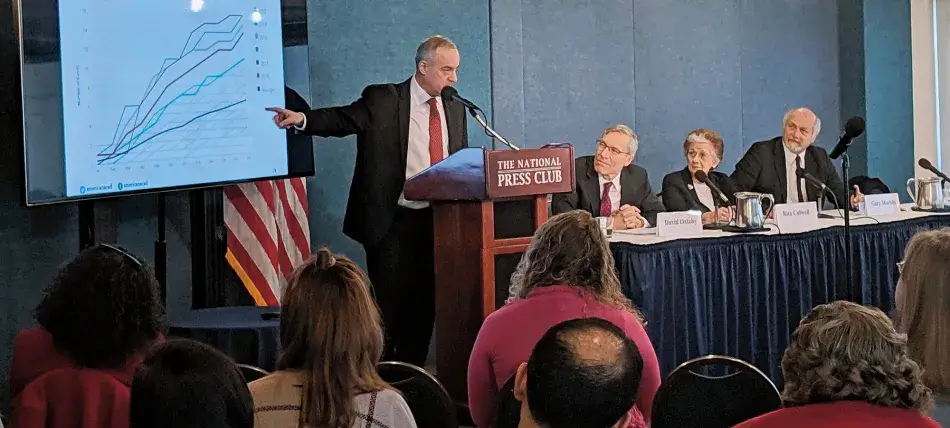
Shaping the Public Face of Science
April 12, 2019
Washington University in St. Louis
St. Louis, MO
Academy members Jonathan Losos, Peter Raven, and Barbara Schaal organized a roundtable discussion at Washington University in St. Louis. Participants discussed strategies and opportunities for science communication and engagement in the St. Louis community. Erica Kimmerling, the Academy’s Hellman Fellow in Science and Technology Policy, presented insights from two Public Face of Science publications – Perceptions of Science in America and Encountering Science in America – and acted as the facilitator for a conversation about science engagement in the St. Louis area.
SPEAKERS
Peter Hamilton Raven
Missouri Botanical Garden
Barbara Anna Schaal
Washington University in St. Louis
Erica Palma Kimmerling
American Academy of Arts and Sciences
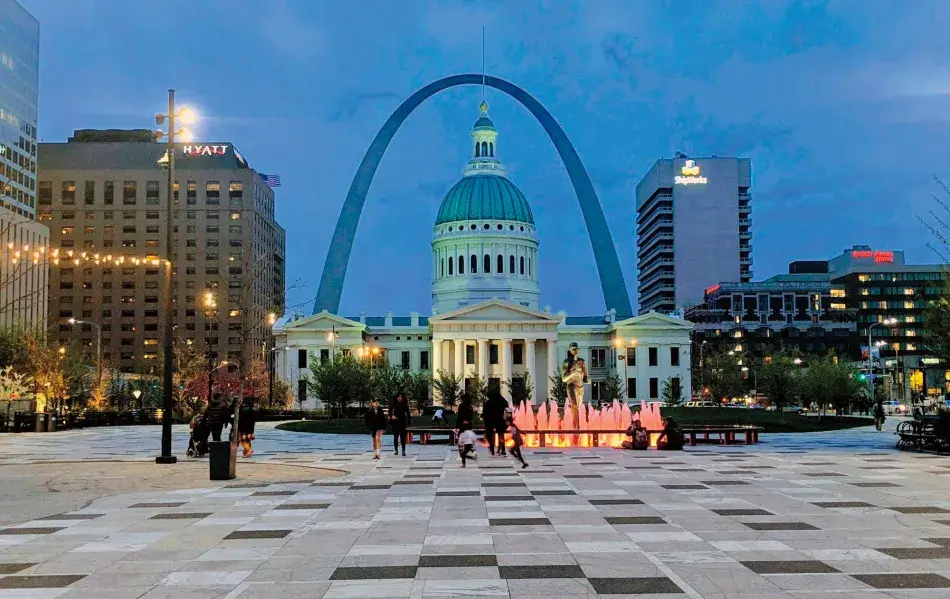
Project
Challenges for International Scientific Partnerships
The Academy’s project on Challenges for International Scientific Partnerships (CISP) aims to articulate the benefits of international collaboration and recommend solutions to the most pressing challenges associated with the design and operation of partnerships. Through research conducted over the past year and roundtable discussions led by members of the project’s Steering Committee, the project has compiled a preliminary list of challenges and opportunities for international science partnerships presented by evolving trends in society, as well as changes in the types and structures of international scientific partnerships.
The project’s Steering Committee identified two groups of major issues and formed working groups to address each one. One working group is focused on large-scale science and facilities, and the other will study scientific partnerships involving countries with limited resources for science. The large-scale science working group will identify a diverse set of partnerships to evaluate successful and unsuccessful organizational dynamics, institutional practices, and public policies. The resource-limited countries working group will survey partnerships, have discussions with policy-makers, and meet with funders and recipients to find opportunities to make partnerships between researchers in the United States and those in resource-limited countries more equitable and mutually beneficial. Working group members will work with the Academy’s project staff to select and review case studies, arrange consultations with topic experts, and develop and refine recommendations that will be highlighted in Academy reports to be published in 2020.
PROJECT CHAIRS
Arthur Bienenstock
Stanford University
Peter Michelson
Stanford University
STEERING COMMITTEE MEMBERS
Claude R. Canizares
Massachusetts Institute of Technology
David Fidler
Indiana University Maurer School of Law
Matthias Hentze
European Molecular Biology Laboratory
John Hildebrand
University of Arizona
David Korn
Harvard Medical School
William Lee
Wilmer Cutler Pickering Hale and Dorr
Shirley Malcom
American Association for the Advancement of Science
Cherry Murray
Harvard University
Venkatesh Narayanamurti
Harvard University
Olufunmilayo Olopade
University of Chicago Medicine
Geraldine Richmond
University of Oregon
Vaughan Turekian
National Academies of Sciences, Engineering, and Medicine
Caroline Wagner
Ohio State University
LARGE-SCALE SCIENCE WORKING GROUP
Arthur Bienenstock, Cochair
Stanford University
Peter Michelson, Cochair
Stanford University
Claude R. Canizares
Massachusetts Institute of Technology
E. William Colglazier
American Association for the Advancement of Science
Inez Fung
University of California, Berkeley
Michael Holland
University of Pittsburgh
Kaye Husbands Fealing
Georgia Institute of Technology
David Korn
Harvard Medical School
Cherry Murray
Harvard University
Philip Rubin
Yale University
Gary Sanders
California Institute of Technology
Diane Souvaine
Tufts University
RESOURCE-LIMITED COUNTRIES WORKING GROUP
Shirley Malcom, Cochair
American Association for the Advancement of Science
Olufunmilayo Olopade, Cochair
University of Chicago Medicine
Bruce Alberts
University of California, San Francisco
Rita R. Colwell
University of Maryland
James W. Curran
Emory University
Ali Douraghy
Lawrence Berkeley National Laboratory
Nina Dudnik
Seeding Labs
Mohamed Hassan
The World Academy of Sciences; Sudanese National Academy of Sciences
John Hildebrand
University of Arizona
Nkem Khumbah
University of Michigan
Peggy Oti-Boateng
United Nations Educational, Scientific, and Cultural Organization
Flavia Schlegel
formerly, United Nations Educational, Scientific, and Cultural Organization
Caroline Wagner
Ohio State University
PROJECT STAFF
John Randell
Gregory Savageau
Rebecca Tiernan
FUNDERS
Gordon and Betty Moore Foundation
William and Flora Hewlett Foundation
Alfred P. Sloan Foundation
Project Meetings
Steering Committee Meeting
December 4–5, 2018
Park Hyatt
Washington, D.C.
Members of the Steering Committee discussed the focus and desired outcomes of the project. The Committee decided to form two working groups: one focused on large-scale science and facilities and a second focused on partnerships with resource-limited countries.
MEETING CHAIRS
Arthur Bienenstock
Stanford University
Peter Michelson
Stanford University
Meeting of the Large-Scale Science Working Group
February 20, 2019
Kimpton Hotel George
Washington, D.C.
The working group discussed their work plan and agenda. On the evening before the meeting, the Academy hosted a dinner with members of the working group and special guests from the D.C. area, including Paul Hertz of nasa; Anne-Marie Mazza of the National Academies of Sciences, Engineering, and Medicine; Roger Glass of the Fogarty Institute; and Rebecca Keiser of the National Science Foundation, to discuss candidly some of the challenges they have faced in international large-scale science partnerships.
MEETING CHAIRS
Arthur Bienenstock
Stanford University
Peter Michelson
Stanford University
Meeting of the Resource-Limited Countries Working Group
April 29–30, 2019
American Association for the Advancement of Science
Washington, D.C.
The working group discussed the group’s research strategy and work plan. Key individuals and experts in the D.C. area, including representatives of the National Institutes of Health, United States Agency for International Development, World Wide Fund for Nature, and the Woodrow Wilson International Center for Scholars, among others, joined Academy staff and members of the working group at a dinner the evening before the meeting and for consultations in the afternoon to share their own expertise and to provide insight on how the United States can overcome challenges with these types of collaborations and be a better partner in this landscape.
MEETING CHAIR
Shirley Malcom
American Association for the Advancement of Science
Meeting of the Large-Scale Science Working Group
May 8–9, 2019
Stanford University
Stanford, CA
The large-scale science working group discussed potential recommendations that could be included in the project’s final report and planned for a major workshop on the topic at the end of July 2019. At a dinner the evening before the meeting, working group members and experts from the University of California, Berkeley, Stanford, and the surrounding Bay Area spoke about the politics of international science and collaboration with China.
MEETING CHAIRS
Arthur Bienenstock
Stanford University
Peter Michelson
Stanford University
Project
The Alternative Energy Future
Extensive studies of energy and climate have concluded that the energy system in the United States must undergo a substantial transformation to address economic, environmental, and geopolitical challenges. As this transformation takes place, both individuals and public- and private-sector institutions will need to adapt to the profound societal change that will accompany the adoption of new energy technologies. The Alternative Energy Future project is developing a cohesive understanding of the social and regulatory factors that can either inhibit or facilitate transformative change in the U.S. energy system. The project objectives are: 1) to demonstrate the value of social science in designing and adopting innovations in the physical energy system; and 2) to create a research program aimed at understanding how governing institutions and policy design must adapt to the demands of a changing energy infrastructure.
Building on the 2011 Academy report Beyond Technology: Strengthening Energy Policy through Social Science and two special issues of Dædalus in 2012 and 2013 on the Alternative Energy Future, the Academy undertook a three-year research project to understand better the factors that contribute to policy durability and flexibility. This study resulted in the publication of the book, Lessons from the Clean Air Act: Building Durability and Adaptability into U.S. Climate and Energy Policy, edited by Ann Carlson and Dallas Burtraw and published in May 2019 by Cambridge University Press.
PROJECT CHAIRS
M. Granger Morgan
Carnegie Mellon University
Maxine L. Savitz
Honeywell, Inc., ret.
STUDY GROUP ON DURABILITY AND ADAPTABILITY IN U.S. CLIMATE AND ENERGY POLICY
Dallas Burtraw, Cochair
Resources for the Future
Ann Carlson, Cochair
University of California, Los Angeles School of Law
Joseph E. Aldy
Harvard Kennedy School
William Boyd
University of California, Los Angeles School of Law
Eric M. Patashnik
Brown University
Barry G. Rabe
University of Michigan
Hannah J. Wiseman
Florida State University College of Law
PROJECT STAFF
John Randell
Gregory Savageau
FUNDERS
Alfred P. Sloan Foundation
The Kresge Foundation
Project Meetings
Lessons from the Clean Air Act: Building Durability and Adaptability into U.S. Climate and Energy Policy
June 10, 2019
Carnegie Institution for Science
Washington, D.C.
The Academy, in partnership with Resources for the Future, hosted an event to celebrate the release of the publication, Lessons from the Clean Air Act: Building Durability and Adaptability into U.S. Climate and Energy Policy. The event featured a keynote address by Henry Waxman, former U.S. Representative from California, and presentations from editors Ann Carlson and Dallas Burtraw about how the findings in the book can be used to guide and create effective energy policies at all levels of government.
FEATURED SPEAKERS
Joseph E. Aldy
Harvard Kennedy School
Dallas Burtraw
Resources for the Future
Jonathan Cannon
University of Virginia School of Law
Ann Carlson
University of California, Los Angeles School of Law
Megan Ceronsky
Center for Applied Environmental Law and Policy
Jeff Holmstead
Bracewell LLP
Vickie Patton
Environmental Defense Fund
Barry Rabe
University of Michigan
John Randell
American Academy of Arts and Sciences
Phil Sharp
formerly, U.S. House of Representatives; formerly, Resources for the Future
Henry A. Waxman
Waxman Strategies; formerly, U.S. House of Representatives
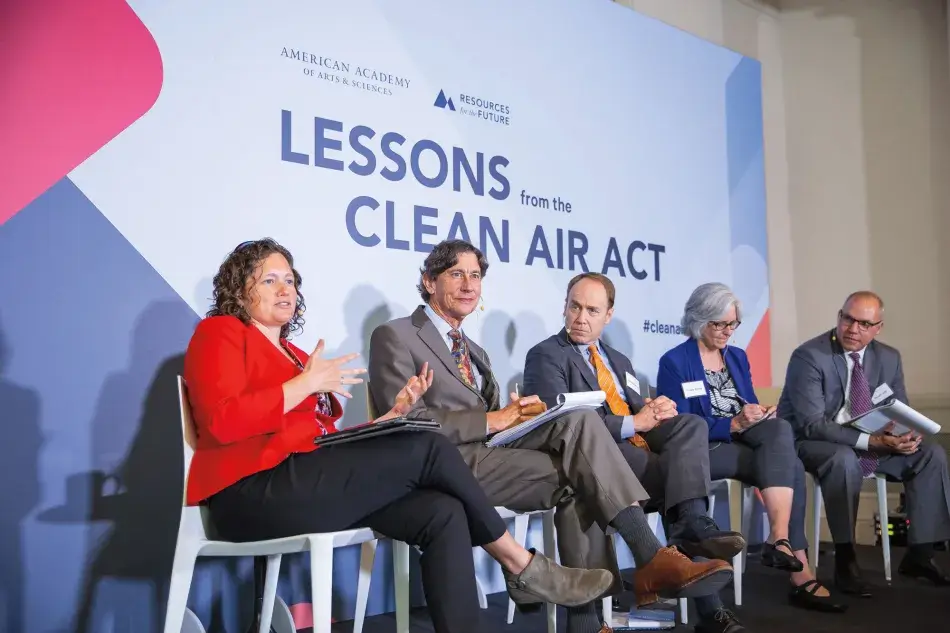
Project in Development
Water Security
Water security is an urgent problem for much of the world’s population. Current estimates indicate that globally, 663 million people lack access to safe drinking water and 2.4 billion people lack access to sanitation facilities, and that number is only projected to increase in the coming years. Political, social, and economic factors compound the challenges posed by a changing climate and increasing demand. The Academy convened an exploratory meeting to explore gaps in current research and policy on regional and international water governance, and is now using the insights from this meeting to develop a proposal for a formal Academy project. Supported jointly by the Academy’s programs in Science, Engineering, and Technology and in Global Security and International Affairs, this highly interdisciplinary study will draw on a wide variety of expertise to better understand the socioecological and policy aspects of water management and governance.
PLANNING GROUP CHAIRS
Allen F. Isaacman
University of Minnesota; University of the Western Cape
Geraldine L. Richmond
University of Oregon
PLANNING GROUP MEMBERS
Rita R. Colwell
University of Maryland
Christopher B. Field
Stanford University
Jacqueline M. King
University of the Western Cape
Ismail Serageldin
Library of Alexandria, Egypt
PROJECT STAFF
John Randell
Kathryn Moffat
Rebecca Tiernan